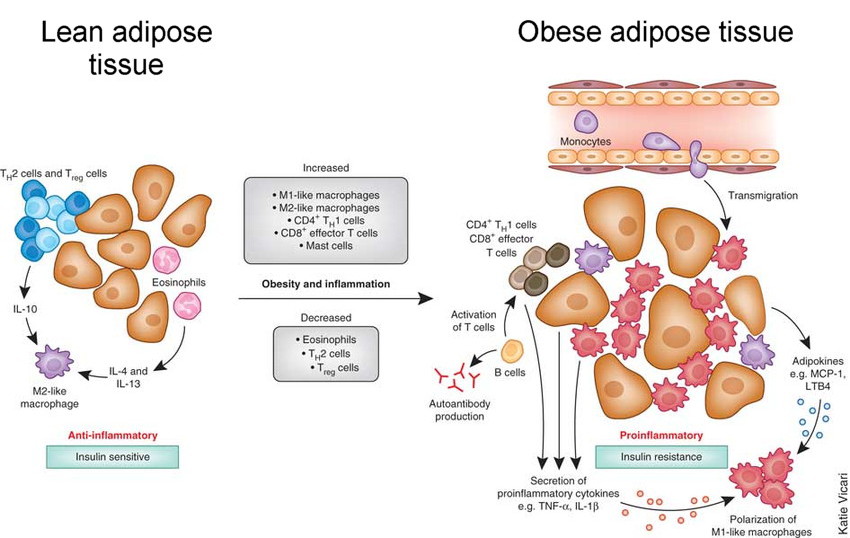12 Causes of Chronic Inflammation
In my last two posts I’ve been talking about chronic inflammation. First I discussed how diet can cause inflammation and chronic pain, and then I discussed what chronic inflammation is and how it can cause many health conditions including cancer, atherosclerosis, and type 2 diabetes.
This week, we’ll learn about the 12 most common causes of chronic inflammation. The good news is that most of them are highly controllable or completely avoidable!
Lifestyle habits:
- Diet
- Smoking and tobacco use
- Alcohol consumption
- Lack of exercise
- Sleep habits
Internal states:
- Stress
- Obesity
- Autoimmune conditions
- Genetic variants
External triggers:
- Viral and bacterial infections
- Allergens and toxins in the food we eat
- Long-term exposure to irritants, such as polluted air and industrial chemicals
Signs that you may have chronic inflammation
Having even one of these symptoms can be an indication that the inflammation response is constantly occurring in your body and/or brain:
- Abdominal fat
- High blood sugar
- Brain fog
- Headaches
- Depression
- Joint stiffness or pain
- Arthritis
- Fatigue
- Asthma
- Digestive problems including gas, bloating, diarrhea, or constipation
- Skin problems including eczema, psoriasis, itchiness, or redness
- Allergies or allergy symptoms, like watery eyes and a runny nose (excessive mucus production)
- Puffiness in the face or under the eyes
- Gum disease
- Erectile dysfunction
1. Diet
More and more research shows how the standard American diet, heavy in animal products, processed food, and added sugar and salt triggers the inflammation response in our body. Even if you live an otherwise healthy lifestyle and maintain a healthy weight, eating these foods puts you at risk for many inflammatory conditions including cancer, heart disease, Alzheimer’s disease, depression, and painful autoimmune diseases.
The worldwide trend toward a plant-based diet is encouraging—everyone from doctors to top athletes are recognizing the health benefits of eliminating animal products and processed food. The dramatic effects of eating a whole food, plant based diet—like complete recoveries from kidney disease, heart disease, thyroid disease, painful autoimmune diseases, diabetes, asthma, migraines, and even cancer—are hard to ignore.
2. Smoking and tobacco use
Toxic chemicals in cigarette smoke (including arsenic, ammonia, radon, and carbon monoxide) and smokeless tobacco (including formaldehyde, cyanide, arsenic, and lead) damage the cells in our body, triggering the immune response of inflammation. Cells are also damaged when chemicals from cigarette smoke combine with oxygen in the body, creating oxidative stress. In addition, nicotine by itself triggers an immune response in our cells.
The health effects of smoking and tobacco use are frightening. Since smoking kills more Americans than alcohol, car accidents, HIV, guns, and illegal drugs combined, your best bet is to avoid it completely.
3. Alcohol consumption
There are at least three ways in which alcohol causes chronic inflammation. First, alcohol damages the cells in our body, triggering the immune response of inflammation. Second, metabolism of alcohol leads to the production of reactive oxygen species, which then stimulate inflammation. Third, hypoxia (lack of oxygen in tissues) resulting from alcohol metabolism can cause inflammation.
Keep in mind that the U.S. Department of Health and Human Services defines moderate drinking as being up to one drink per day for women and up to two drinks per day for men. This falls to just one drink per day for both men and women over age 65.
A 2018 study of alcohol consumption in 195 countries showed that having just one alcoholic drink per day increases your chances of dying or suffering from cancer, stroke, heart disease, car accident, liver disease, and tuberculosis. While alcohol has been shown to have a mild protective effect against heart disease and diabetes, this effect is offset by the increased risk of cancer. The researchers who conducted the study concluded that the “level of consumption that minimizes health loss due to alcohol use is zero.”
4. Lack of exercise
Large population-based studies consistently show that regular aerobic exercise decreases chronic inflammation. There are at least three reasons why:
1. By reducing body fat. As you’ll learn in #7, excess fat tissue creates the inflammatory response.
2. By contracting muscles and increasing muscle mass. During exercise, working muscles produce molecules that have anti-inflammatory effects.
3. By strengthening the immune system, making our acute immune response more efficient and effective. This reduces the chances that we’ll experience repeat or prolonged infections and the accompanying chronic inflammation.
5. Sleep habits
Sleep is a critical part of our overall health, and one that many of us ignore. It might surprise you that too little sleep, too much sleep, and chronically disturbed sleep all increase levels of inflammatory markers in the body, in as little as one night.
One reason for this is our circadian rhythms: These physiological changes that follow a daily cycle help to regulate our sleeping and waking, hormones, appetite, digestion, body temperature, and—you guessed it—our immune system. Irregular circadian rhythms have been linked to chronic inflammatory conditions including obesity, diabetes, and depression.
A second way that sleep increases inflammation is by increasing stress, which triggers our immune response. A third way that sleep increases inflammation is by affecting gut health. Lack of quality sleep can change the makeup of our microbiota, increasing disease-causing bacteria and decreasing beneficial bacteria.
6. Stress
Stress is a risk factor in 75% to 90% of disease, including cardiovascular disease, metabolic disease, depression, Alzheimer’s disease, Parkinson’s disease, and cancer.
The reason for this is that stress activates our immune response, triggering inflammation in both our body and brain. While acute stress can have a temporary positive effect on immune system function, chronic stress—the kind that the majority of us experience—has negative effects.
Stress, and the personality and habits that drive it—like being type-A and working long hours—are often admired in our society. If we’re not stressed out, we must not be working hard enough! But chronic stress is just as detrimental to our health as obesity and smoking, and reducing stress in your life is one of the best things you can do for your health. (I’m passionate about this topic, and I’ll do a series of posts about stress later this fall—stay tuned!)
7. Obesity
Our immune system evolved to protect us from things that might harm us. So maybe it shouldn’t come as a surprise that having excess body fat triggers the immune system response of inflammation.
In lean adipose (fat) tissue, immune system cells repair tissue and protect against pathogens. This is an anti-inflammatory, insulin sensitive environment.
As you can see in the image below, individual adipocytes (fat cells) grow in size as one becomes more overweight. As the adipocytes grow and cellular stress increases, the environment becomes pro-inflammatory and insulin resistant, often leading to the condition of type 2 diabetes.
8. Autoimmune conditions
There are more than 100 recognized autoimmune conditions—defined as conditions in which your immune system mistakenly attacks your body’s own cells. This causes inflammation in certain parts of the body or throughout the body. Some common autoimmune conditions are celiac disease, Crohn’s disease, lupus, fibromyalgia, rheumatoid arthritis, endometriosis, multiple sclerosis, type 1 diabetes, chronic Lyme disease, narcolepsy, peripheral neuropathy, and thyroid diseases.
Researchers don’t know exactly what causes autoimmune conditions, and it’s clear that different factors trigger autoimmune conditions in different people. Risk factors include:
- An injury or infection that doesn’t resolve
- Having someone in your family with an autoimmune condition
- Being overweight
- Smoking
- Certain medications
- Environmental pollution and chemical toxins
Another significant risk factor is being female. Overall, research shows that 75% to 80% of autoimmune condition sufferers are women. Researchers have identified a trigger for autoimmune conditions, called Age-associated B Cells, that may help explain why women tend to suffer from them more than men.
Taking steps to reduce sources of inflammation, like making changes in diet and reducing stress, are often effective in alleviating autoimmune conditions. If you suffer from an autoimmune condition, do your research, look at all 12 causes of inflammation in this post, and consider how you might be able to reduce inflammation in your body.
9. Genetic variants
While lifestyle is the most common cause of inflammatory conditions like heart disease and diabetes, certain inflammatory conditions like ankylosing spondylitis, Crohn’s Disease, ulcerative colitis, and psoriasis can be linked to genetic markers. And researchers have identified a gene called AUF1 that is linked to inflammation, accelerated aging, and cancer.
Though it can be exciting to think that discovering a causative genetic factor could bring us closer to curing certain diseases, it’s important to keep in mind the lessons that the burgeoning field of epigenetics is teaching us. While we may be genetically predisposed to certain diseases, whether or not those genes get turned on or off is heavily influenced by our lifestyle and environment.
10. Viral and bacterial infections
When a viral or bacterial infection doesn’t resolve on its own or with medical treatment, chronic inflammation can occur. Certain viruses tend to be difficult for our immune system to fight off (like HIV-1 and herpes), others can lay dormant and reoccur, and others can interfere with our immune response. The use of antibiotics, while often life-saving, has led to the development of antibiotic resistant bacteria—bacteria that are much more difficult to kill. Sometimes, an infection can even trigger an autoimmune condition.
These risks give us all the more reason to avoid contagious infections, get proper medical treatment as soon as possible, and rest to allow our immune system to do its job.
11. Allergens and toxins in the food we eat
If you have an allergy to a certain food, you probably already know it. Intolerances can be harder to identify—you may need to track your symptoms and experiment with elimination diets in order to isolate the offender. It’s worth taking the time to figure out which foods trigger the immune response in your body, because regularly eating these foods can damage the lining of your gut, cause inflammatory digestive issues, and lead to inflammatory symptoms throughout your body that you may not think are related—like fatigue, rashes, headaches, and neurological problems.
In addition, there are many toxins added to food, used in food production and packaging, and found in food as a result of the environment that cause inflammation and increase the risk of developing inflammatory diseases like cancer. These include:
- Pesticides
- Food additives, preservatives, and coloring
- Refined vegetable and seed oils
- Trans fats
- Mercury (found at high levels in certain fish)
- Genetically modified organisms (GMOs)
- Polycyclic aromatic hydrocarbons (created when fat is burned)
- Heterocyclic amines (created when meat or fish is cooked on high heat)
- Acrylamide (created by frying starchy foods)
- Dioxins (these accumulate in fatty foods)
- Bisphenol-A (BPA; found in cans and plastic containers)
12. Long-term exposure to irritants, such as polluted air or industrial chemicals
While most causes of chronic inflammation are avoidable, it can be nearly impossible to prevent yourself from being exposed to air pollution. And sadly, research shows how air pollution contributes to neuroinflammatory conditions including stroke, Alzheimer’s disease, and Parkinson’s disease. In addition, air pollution causes inflammation throughout the body, increasing the risk of heart disease and other inflammatory conditions.
Industrial chemicals can also be an issue if you live near certain types of manufacturing plants or if your job exposes you to chemicals. Toxic chemicals can cause chronic inflammation and conditions like cancer that sometimes develop years later. Exposure to certain pesticides and chemicals is the likely cause of Gulf War syndrome, which often consists of neurological problems, memory problems, fatigue, tumors, skin conditions, digestive issues, headaches, and muscle and joint pain.
Always be aware of potentially toxic chemicals that you may be exposed to, and do your best to avoid areas with heavy air pollution. If you suspect that you’ve been exposed to a harmful pollutant or chemical, talk to your doctor immediately.


